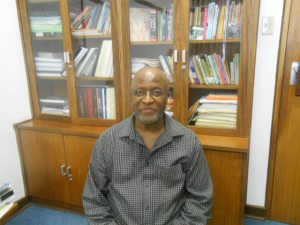By Sihle Jack
He starts by examining my knowledge of the IsiXhosa language, then proceeds to take me to task.
“Ndizakuthetha ngesiXhosa ke mnake, Sihle” [I will speak IsiXhosa only].
That was all it took for me to question my ability to conduct an interview in IsiXhosa. He further asks me where I am from, to which I respond, “eBhayi, tata,” [Port Elizabeth, sir]. He bursts into laughter and gives me homework. My homework is to go back home and ask my parents what the “real” isiXhosa name for PE is. After which he finally takes a seat and tells me about his childhood.
Dr Mhlobo Jadezweni is one of seven children and grew up in Idutywa in the Transkei. Talking about his childhood cheers him up as he tells stories of how he was lucky enough to have never experienced poverty at home. Dr Jadezweni says it was his mother, Ma Khumalo, who instilled humility in all of her children. She taught them the importance of sharing and was kind enough to share whatever spares of food or supplies that they had with their neighbours.
We are interrupted by a ringing cell phone. It is his and he apologises for having to take the call.
“I just had to ask someone to look after the crops back home in, Idutywa. Do you know meilies?” he smiles grins. We go back to our conversation where he tells me with confidence that he studied a Bachelor of Arts (BA) at the University of Fort Hare. His reason for obtaining this degree is simple: he wanted to get a degree that would teach him the way of life as he felt Apartheid required him to understand the situation in order to be clear on how to move forward as a country. It is in this that his love for his country shows. Dr Jadezweni mentions how he would go to gatherings with a number of key figures who had a significant impact on the struggle against Apartheid, although he did not play any leadership role. Black Consciousness, a term coined by Steve Biko is one of the many teachings he believes black people should learn. “It teaches black people their own identity and to form their own identity as well as independence.”
The humility shines in his eyes when I ask him about his published and multi-translated children’s book, “uTshepho Mde: Tall Enough”. The book has been translated into several languages, namely Portuguese, Afrikaans and IsiZulu. He is more than humbled by the outcome of writing the book and looks forward to writing more once he has retired. In the meantime, he continues to contribute for other writers.
It is quite clear that this man is indeed a family man. Instead of talking more about the books he has contributed to writing, he tells me about his granddaughter, who is living in the United Kingdom with her mom. I could tell just how much he loves her even before the words came out of his mouth. He goes on to express how sad he is that he cannot spend more time with her. While an evident family man, he is also passionate about lecturing and tells me to refrain from gossiping about him with his students when I tell him that I asked around about him.
A favourite among students, Dr Jadezweni says that teaching is one of his many loves as he gets to watch students gain knowledge and make something out of themselves. A close second is his love for rugby even though he does not support any particular team.
While I thought that the conversation would have ended in his office, I received an email after the interview from this gravely humble man thanking me for talking to him. In fact, the email looked like this:
I enjoyed talking to you Sihle. Best of luck!
